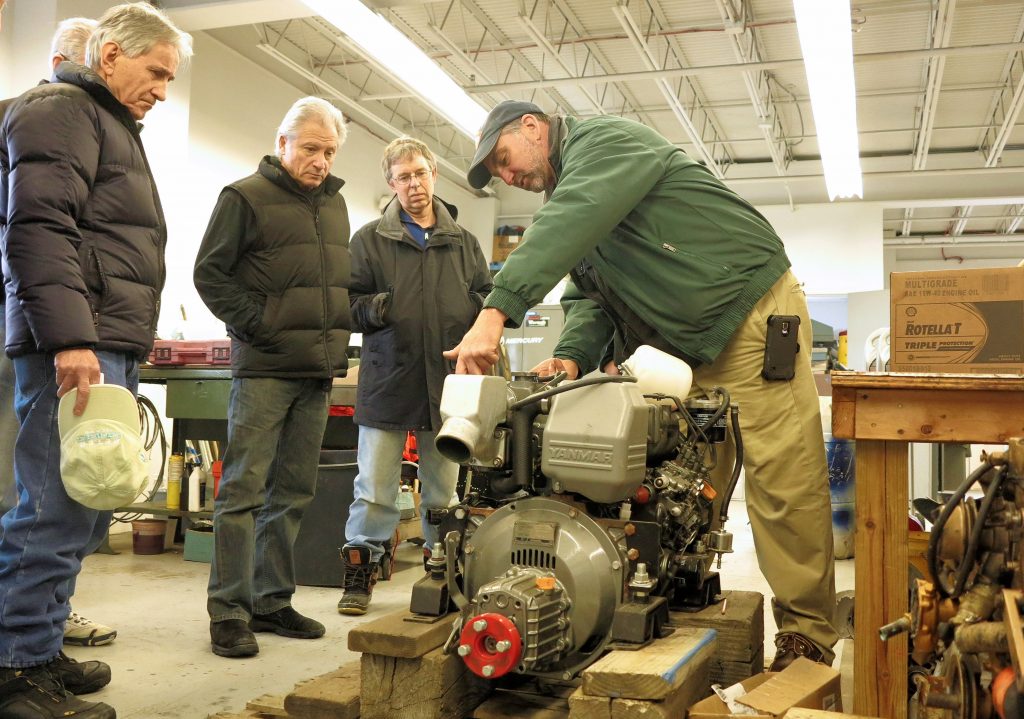
With pandemic times still about, new and used boat sales have been at record highs. This means for the upcoming 2021 boating season there will be a new crop of captains on the water. The reason for the high bump in sales is because on a boat, families can keep the same safe bubble they have at home. They can get out of the house and enjoy the outdoors on their floating piece of heaven minus the masks and their summer dining will always have a view. Being on a boat means that many work from home people can change the view of the street to the bay.
For new boaters and ones that are novices, it is important to learn how to be the master of your craft for the purpose of safety and maximum enjoyment. You can have the latest technology that may include bow and stern thrusters or easy joystick docking but if you don’t know how to read the wind and current you are still going to bonk the dock. You can YouTube all the videos on maneuvering but nothing will prepare you for approaching a tight slip with an opposite 15-knot wind and a cross-current at three knots.

Start With the Basics
As a new boater 19 years ago we sought to learn the basics with the Coast Guard Auxiliary safety course before we brought our used boat down from Lake Champlain. This classroom course covered topics on boat-handling skills and safety, boating terms, boating emergencies, proper seamanship, VHF marine radio procedures, knots, engines, trailering, docking, and navigation rules. (Think right – red- return)
To get more detailed on some of these topics we bought the “Chapman Piloting & Seamanship” book. Chapman’s book could be considered the bible for all things boating. I read carefully through the sections that discussed maneuvering in bad seas, docking, anchoring and dock tying.
Practice
While reading, taking classes and watching videos is helpful, you needed to learn by doing because no book can teach you how to dock a boat or pilot one in rough seas. With the season starting in a couple of months I suggest new captains get out and practice once you are commissioned.
Like many other skills, boating needs practice to get good at it. We can learn from teachers and mentors but getting valuable experience is between you and your boat because as captain you are responsible for it and your guest’s safety. If your crew is your mate or significant other, make sure they take the classes as well and go on your sea trials.
If you are not comfortable going out on your own, I recommend going through the advertisements of L.I. Boating World and look for a captain to assist. For most newbies, a couple of times under experienced eyes are all that is needed to get you started.
When it comes to docking, especially for those having a tight slip, the only way to get good at it is to practice. An old salt told me, every time you get your boat at the dock and the gel coat is in place, you’ve done well. Also, there is a time where the entire marina will be watching you when you have made a total mess of getting back. It has happened to all of us. Take an afternoon off during the week when no one is around and practice docking. Also, nearly all marinas will assist you. If docking conditions are not good, a $5 tip to a deckhand to catch a line will be much cheaper than a fiberglass repair.

Experience
Getting the basic experience is great for days guaranteed to be sunny and calm. Any seasoned boater will tell you about the best-laid plans for fun in the sun do not always work out. On July 25th, 2010 we went from hot sunny skies to being caught in a deadly (and learned later, fatal) 85 mph microburst in a mooring field off City Island.
I made it through barely missing boats in what was the longest three minutes I have ever had at the helm while watching moored boats around and in front of flip or capsize. I missed hitting these boats by staying calm and letting my experience literally control my hands. Stuff happens on the water and you need to be ready to deal with it. (I will confess that when at the dock a double shot of 12-year aged rum was needed to calm the nerves from the ordeal)
The normal way to gain experience of course is to use the boat locally. A better way to kick up your boating experience to the next level is by cruising. For our second season, we cruised a loop around the Long Island Sound for eight days. This improved our navigation and docking skills due to the different conditions we came across.
Becoming a good boater poses a quandary: how do you gain valuable boating experience in bad conditions unless you find yourself in a few bad conditions. In other words, you need to be on the water in different situations to learn.
I am not recommending boaters to head into a thunderstorm or stormy seas. That can be very dangerous and should always be avoided.
However, experiencing choppy seas and windy conditions is a way you learn how you and your boat handle when a situation arises. Traveling from Port Jefferson to Port Washington in our second season we were caught in 25 mph winds and two-foot choppy seas, topped off by hail. At first we were a bit nervous. Then we checked the weather radar on our early model smart type phones to realize the storm would pass soon.
Being out there and realizing which way to point the bow and knowing our boat was secure and made us more confident in open water situations years later. While we were not in a dangerous situation it was a valuable experience on how to handle the boat when things got a little ugly.
About starting Captain Doug, a dock neighbor told me of his experience “I think that there was some trial by fire and that you can’t be afraid to make mistakes (they are going to happen). Never be afraid to ask questions, and certainly never, never be afraid to ask for help! Boaters will help other boaters! Ask experienced boater questions.” His experience will work for all novices.
The bottom line is that anyone who is going to use their boat will at one-time encounter situations out of their comfort zone. The first rule is safety and to stay calm. Monitor the weather and know when it is not a good day to go out. Never push yourself or feel obligated to leave the dock for any reason. You are always responsible for your actions on the water. If conditions look like they are going bad while you are on the water look at your charts and chart plotters so you know where you can duck for cover and safety. Lastly, know what you can and cannot handle. We have used this advice and put on thousands of miles visiting places as far east as Nantucket, west to Buffalo and north to the Thousand Islands, Lake Champlain and¬ Montreal and as far south as the Chesapeake Bay. (My L.I. Boating World cruising stories available upon request at tab@tabhauser.com)
Tab Hauser is a U.S. Coast Guard licensed captain, and a member of the Explorer’s Club. He has been boating on Long Island since 2006. Offseason he is a travel writer and event photographer seen at www.tabhauserphoto.com and www.tabhauser.com.
